- Home
- William Bell
Julian Page 13
Julian Read online
Page 13
“I’ll explain. Why don’t we go to the Arbor Room?”
I hoped if I got her on familiar territory with a lot of people around she might feel less threatened. Her eyes flicked side to side, as if seeking help in the throng of bodies moving around us. She held her backpack against her chest, shoulders pressed inward.
“I’m a friend of Jason’s,” I lied.
She met my eyes, briefly, then looked down again. “I don’t remember him mentioning anyone named—whatever.”
“I won’t take up much of your time. But we need to talk. Really.”
“What about?”
“Let’s go to the Arbor Room,” I repeated, “and I’ll explain.”
She relented. Fifteen minutes later we were sitting at a table in the café. I had bought drinks for us. Marika seemed a little less wilted but still wouldn’t meet my eyes. She stared at her hands. I took a hit of my coffee and began.
“Okay, here it is. I know about Jason and the peace bond.”
Her head snapped up, as if I’d hit her. Her chin dropped. A pink flush bloomed in her face.
“How do—”
“Let me finish. Like I said, I know about the bond. I also know Jason violated it.”
“How could you know—whether he did or didn’t?” Her dark eyes flashed with anger and her voice rose a notch. “And what business is it?—you’re lying—what’s going on here?”
“Please keep your voice down.”
She reached for her backpack on the chair beside her and planted her hand on the tabletop, moving to get up. But I was holding up my cell, the screen bright with the photo of her and Jason kissing on Bloor Street.
Panic crashed over her. She gasped and dropped back into her seat, shaking.
“Who are you?” she whispered.
“Your parents hired a lawyer to make sure Jason didn’t harass you anymore. They didn’t trust him to honour the bond. The lawyer hired me.”
“And you—what?—followed me? Where? For how long? That’s sick!”
“Marika, I’m on your side here. I was hired to find out if Jason is bothering you.”
“You’re the one who’s harassing me! Invading my privacy. This is—this is humiliating!”
“If you’ll just let me explain—”
Her eyes widened. “I see what you’re after. It’s blackmail, isn’t it? You bastard!”
The whole thing was coming apart. Trying to warn Marika had been a bad idea. I gave it one last shot.
“Think about it for a second, will you? I could have sent the photos to the lawyer yesterday, after I saw you at the theatre. But I held off. I didn’t feel right about it. I wanted to talk to you first.”
“Yeah, sure, so you could—”
“I don’t want anything from you!” I almost shouted, my patience frayed.
She pressed her lips together, red-faced and seething. She took a deep breath.
“Why should I trust you?”
“Because by talking to you I’m putting my job on the line.”
She took a drink of cola, her brow creased. “So you know everything.”
“Everything? No. I know you met with Jason and spent an hour and a half at the movies with him. I know you were … romantic. That’s all. I can draw conclusions, make some guesses, but seeing you and him together changed things.”
“How?”
“I was hired under a certain understanding, which turns out to be false—maybe. So I have to ask: has Plath ever physically abused you?”
Her eyes dropped and her shoulders slumped. “Never,” she said, her voice barely audible. “Sure, we’ve had fights, but he’s never been that way.”
Was she lying? Probably. Her instinct would be to protect Plath. Or was it resentment that a stranger had barged into her personal life that made her seem furtive?
“So why did you swear out a peace bond on him?”
This was the ultimate question. The answer would clear up everything, I hoped.
In the same low voice, she replied, “I didn’t.”
I picked up my mug of coffee and took a slow drink, putting two and two together. If she was telling the truth, her answer shone a bright new light on the whole Rubashov family dynamic.
“Your parents?”
Marika nodded. “I mean, it’s true I swore out the bond, but my parents—my father, to be exact—made me.”
“But why?”
“Because he hates Jason. He never accepted him. Jason is from the wrong neighbourhood. He only made it to community college. It’s the old, tired ‘He’s not good enough for my daughter’ thing. Jason wants me to stand up to my father but I’ve never been able to. It’s pretty much the only thing we argue about.
“One night—I can’t believe I’m telling you this—Jason got drunk and came over to the house. He stood under my window, yelling for me to come down and go away with him. He was being an idiot, I know that, but he was upset. My father burst out of the house and confronted him.”
“Oh-oh.”
“Oh-oh is right. They got into a slanging match, hollering louder and louder. I ran down to the driveway to make them stop. They were standing toe to toe. I screamed at Jason to go home and pushed between them. Jason shoved me aside. I fell. That stopped them both. Jason stood there with his arms hanging down at his sides, bleary-eyed and confused. He was so drunk he could hardly stand up. I finally persuaded him to go home.”
Marika picked up her cola and drained it.
“The next day my father said he was going to the police. He made me go with him. I think he was glad, in a way, that he finally had something on Jason. He forced me to tell the cops that Jason had pushed me down—which is assault, he said. And he made me press for a peace bond. It’s not fair. Jason didn’t mean it.”
I felt like I’d heard it all before—because I had. Marika was saying word for word what Rawlins had described.
“Are we done now?” she asked, spitting out the words. “Are you satisfied?”
I didn’t reply.
“The next time you go butting into someone’s life, maybe you should get your facts straight,” she said.
I sighed. “That’s what I’ve been trying to do. That’s why I wanted to talk to you.”
“Are you going to send the photos to this lawyer my parents went to?”
“I don’t know. He was hired by them and he has to answer to them. I’m obliged to report to him. I have to tell him something.”
She forced herself to dial back the anger. “Can’t you just forget about what you saw? If you tell on us, Jason may be arrested.”
“It’s possible.”
“He’ll have a record! It’s hard enough to get a job in this city!”
“I’ll think about it. That’s all I can promise. Maybe you can work this out with your father. Get the bond lifted.”
Her eyes flared again. My answer hadn’t satisfied her.
“You don’t know him. He’d never admit he was wrong. Are you going to keep following me? Because if you do, I’ll go to the cops.”
“I’m sorry I’ve upset you. I’ve got no more to say.”
She rose to her feet. Her next words were like acid thrown in my face.
“You know what, Mr. hot-shot investigator? Maybe the peace bond is on the wrong person. Maybe it’s my father who deserves it. Or you!”
“Marika, how did you get the bruise on your arm?” I asked.
“You’re so smart, you figure it out. Now piss off,” she hissed. “This conversation is over.”
Then she stomped out of the café.
My old habit of thinking too much was a flaw that complicated simple things, a wind that pushed me off course if I let it. I had humiliated Marika, barged into her life, bullied her into talking about her personal relationships. I had done it to give her a chance, but I hadn’t handled it well and I felt bad about the whole scene. What was I going to do? I owed Curtis an accurate report. I had told Marika I’d hold back the photos for a while. Without them, her pa
rents would have nothing solid to take to the cops.
But the ugly welt I had seen on her arm nagged at me. It was the mark left by someone clamping you in his grip until you did what he wanted. Who did it? Plath, or her father?
At home that night I sat down and wrote: I followed Marika Rubashov to a movie theatre after her afternoon class. Jason Plath was also in the theatre. It was clear that she didn’t mind him being there.
I composed the e-mail and sent it to Curtis.
Without the photos.
TWENTY
THE FOLLOWING DAY I was leaving the store after the morning’s work when my Curtis cell rang.
“Want to go to the movies tomorrow?” said the voice on the other end. Suddenly the day brightened.
“Ninon?”
“Surprised?”
“I sure am.”
“Well, what do you say?”
“I say yes. Where do we meet?”
“The park. About one o’clock.”
“Okay.”
“See you.”
And she clicked off.
The next morning at work the hours crawled by. My upcoming date was a glimmer of light that I held in the centre of my mind, pushing away the murky questions raised by strange men watching my house, mysterious temporary boarders in the downstairs rooms, and the confusion stirred up by Marika, her ex- or maybe not ex-boyfriend, and her parents. The worst part of the whole three-dimensional mess was that there was nothing I knew for certain, and I felt I was stumbling around blindfolded. Not that the part of my life devoted to Ninon was very clear either.
At last the hands on the clock came around to the position I’d been waiting for. After checking my appearance in the dusty mirror above the sink in the store’s cramped bathroom I headed for Grange Park, thoughts of Ninon buzzing like electricity in my veins.
I found her with the two chess players I had talked to weeks before, seated opposite the tall one. She was wearing the same outfit as last time except she’d substituted scuffed, low-cut runners for the sandals. She moved a piece and slapped the plunger on the clock. Her opponent growled.
“Got me again.” He looked up at me. “You know this guy?”
In reply Ninon smiled and stood and threw her arms around my neck. She never stopped surprising me.
“Thanks for the game. See you,” she said to the two guys, who didn’t reply. Hooking her arm in mine, she led me toward Dundas Street.
“So where are we going and what are we about to see?” I asked.
“To the Ryerson University film club’s Friday-afternoon screening. They’re playing two old French films.”
As she spoke she flipped a plasticized card from her pocket.
“See? I’m a member of the film club—for this afternoon anyway,” she said, slipping the card back into her pocket.
But not before I noticed the photo on the card wasn’t Ninon but a grumpy-looking round-faced guy. I didn’t say anything, nor did I point out that I didn’t speak French. The prospect of a few hours with Ninon was enough for me.
“I’ve missed you,” I said.
She took my hand but didn’t reply.
For the second time that week I found myself on a university campus, but Ryerson’s was as different from Marika’s school as it could be. There were no stately stone buildings that seemed imported from an earlier century, although our destination, a big three-storey brick structure on Gould Street beside the student union, looked pretty old. We entered and followed hand-lettered signs to the second floor, where double doors had been thrown open to reveal a large room with ranks of chairs arranged before a screen suspended from the ceiling. Most of the chairs were occupied by students, chatting together or thumbing their cells.
“Just walk straight in like you own the whole building,” Ninon whispered.
Before I could reply she took my arm and directed me forward. “Hi!” she said cheerily to the guy sitting by the doors and checking IDs. She waved her card in his direction as we sailed by, her thumb covering the owner’s image, and we were inside before the doorman could react.
Nice move, I thought.
We found two empty chairs at the back and settled in. I reached over and dragged Ninon’s chair toward me until it touched mine.
“I hope you like the films,” she whispered. “There are two—Jean de Florette and Manon of the Spring—spring as in water, not the season.”
“I don’t speak French, but I can follow the action.”
“There are subtitles, I think.”
“Oh.”
“The best part is, the stories take place in Provence.”
I laughed. “I should have known.”
The lights dimmed and the screen came to life and the intro credits rolled by to the music of a harmonica. The scenery was beautiful. A grey-white escarpment streaked with pine trees, a stone farmhouse, a stone hovel, stony ground—and cicadas buzzing in the background. Olive groves, vineyards, vegetables—it seemed anything would grow there with enough water. Water was the point of the story, Ninon had told me.
English subtitles began to march across the bottom of the screen like an unstoppable column of soldiers, and I soon tired of switching back and forth between the pictures and the text. The presence of Ninon breathing softly beside me made it hard to concentrate. A young family—parents and a little girl, Manon—moves from the city to a farm. The father is full of dreams and plans, but two locals conspire to make the family fail by blocking up their only source of water—a spring on the nearby mountainside. Crops die.
Sometime during the slow defeat of the family Ninon rested her head on my shoulder, and a bit later I heard her sniffling. Was it the tragic story or seeing her homeland on screen that brought the tears? Or maybe both?
At the end, when her father is dead and her mother sells the farm to the two bad guys, the little girl sees them unblock the spring. You wonder if she’s old enough to realize what has happened, which sets up for the sequel, Manon of the Spring.
The lights came on and the audience scuffled their feet, yawned, rumbled with quiet conversations. People got up to walk around or leave the room in search of refreshments. Ninon sat up and stretched, wiping her eyes with the back of her hand.
“Good, non?” she said.
“Yeah, but sad.”
“It’s the Garden of Eden story,” she replied, adding, “People can be mean sometimes.”
She yawned and stretched again. And that was when I noticed a red pinpoint on the underside of her arm, just below the elbow. A needle mark.
My stomach lurched. I stifled a gasp.
“What’s the matter?”
“Nothing.”
I was on the verge of asking her what caused the mark when the room lights dimmed and she settled against my shoulder. The story began to unfold but I was unfocused, taking in nothing, chasing thoughts around the inside of my head. I had seen only one puncture wound on Ninon’s arm. Were there more? Not for the first time I was reminded how little I knew about the girl snuggled up against me, contentedly taking in the second feature. Homeless people sometimes turned to drugs to help numb the pain in their everyday lives. Was Ninon using? Did that explain her pallor and lack of energy at times? Did it account for her unpredictable behaviour?
I couldn’t help myself.
“Ninon,” I whispered to the top of her head as it rested on my shoulder.
“Mmm?”
“What’s that mark on your arm?”
She looked up, her face almost touching mine. “Tell you later,” she whispered.
What could I say? I waited, while Manon took her revenge on the two bad guys and on the townspeople who had kept silent while her family’s dreams were ruined.
Ninon and I emerged from the building into the bright afternoon sunlight and made our way to a sidewalk café just around the corner on Bond Street.
“Hungry?” I asked.
“Not right now. You go ahead if you want,” she answered.
I was too worried
to eat.
“Ninon,” I said. “The mark on your arm. Can I ask?”
“Oh, it’s nothing. They took a blood sample.”
“Because …” I let the word hang.
“Because, well, it’s a long story.”
“I’m not in a hurry.”
Ninon sighed. “Well, you don’t know this but I sort of live in a kind of hostel. I can stay there three nights running and then I have to leave. But they let me come back. It’s just a technicality, they said. As long as I don’t stay longer than three nights at a time, I can keep coming there. They’re pretty nice.”
The Guiding Light Mission.
“And the fourth night?” I asked. “Where do you stay?”
“Here and there. Wherever. Anyway, to get back to my needle mark, which you probably think proves I’m a junkie or something—one of the counsellors at the mission is really nice. Her name’s Odetta. She said I was too pale and rundown all the time, so she talked me into letting the hostel’s doctor—he comes once a week—take a blood sample. Odetta thinks I might be anemic.”
“So a few vitamins and some iron might be all you need.”
“Yup.” She smiled mischievously. “You look relieved.”
I shrugged my shoulders, hoping my guilt didn’t show.
“Don’t worry about me, Julian. I’m fine.”
I cast about for a change in topic. “The movie. Did you recognize the location? I mean, was it filmed near where you grew up?”
“Not real close, no. But the landscape is similar. Seeing the movie reminded me of a million things.” Ninon took a long drink. “Do you ever get lonely?”
“Not when I’m with you. But other times? Yeah, but I’m used to it. When you don’t really belong anywhere you’re never not lonely.”
“What about those families you stayed with? Didn’t they make you feel welcome—at least for a while?”
“They did the best they could. But no matter how hard they tried, I was an outsider. They didn’t want me to feel that way, but that was what I was, and I knew it.”
Ninon smiled. “It’s kind of like fate, isn’t it? Us meeting, I mean. Two orphans.”
“Thanks to Van Gogh,” I said.
“Do you miss your parents? I know you never knew them. Do you miss them anyway?”

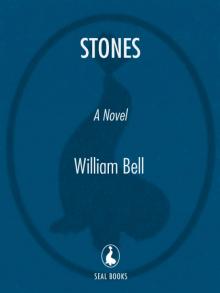 Stones
Stones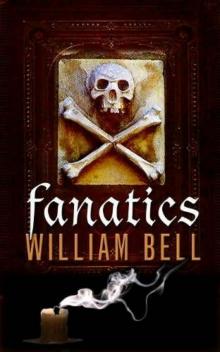 Fanatics
Fanatics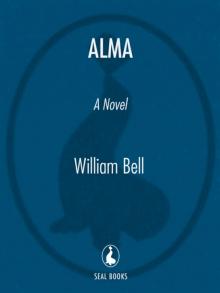 Alma
Alma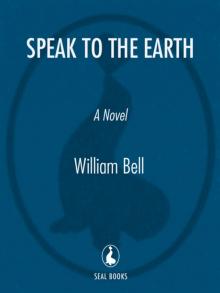 Speak to the Earth
Speak to the Earth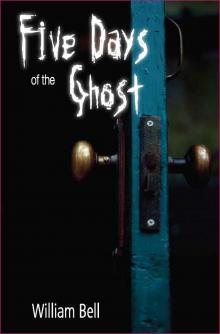 Five Days of the Ghost
Five Days of the Ghost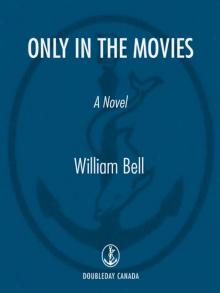 Only in the Movies
Only in the Movies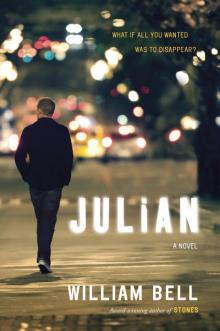 Julian
Julian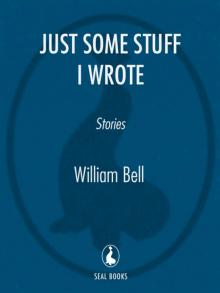 Just Some Stuff I Wrote
Just Some Stuff I Wrote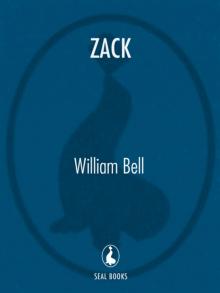 Zack
Zack Forbidden City
Forbidden City Death Wind
Death Wind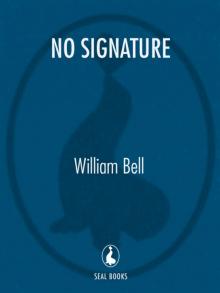 No Signature
No Signature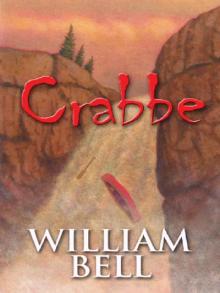 Crabbe
Crabbe